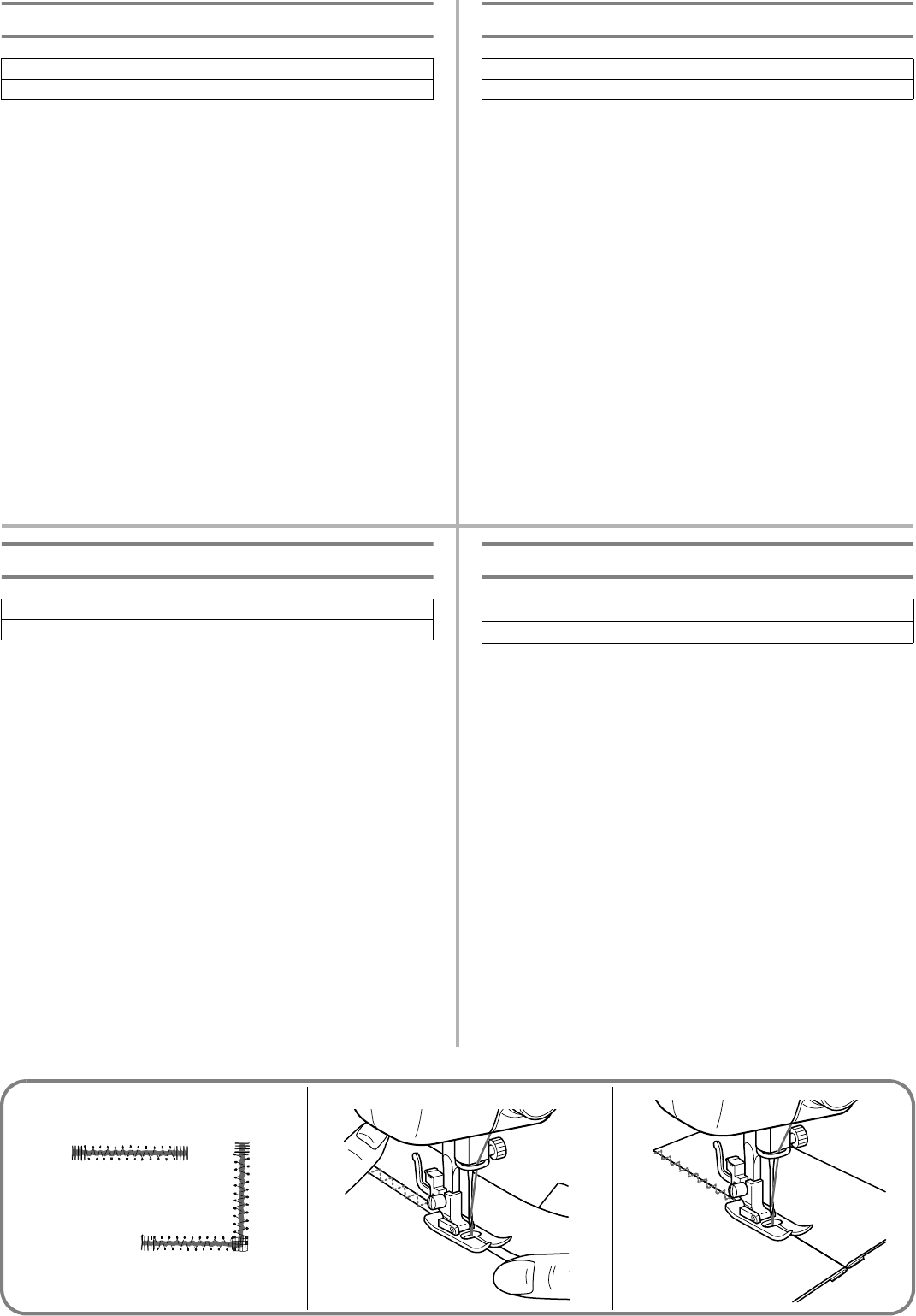
28
Elastic Stitching
The Elastic Stitch can be used in 3 ways: mending, sewing elastic
or joining fabric. Each is explained below.
Set the pattern selection dial to 14.
MENDING
1. Place the reinforcement fabric under the tear to be mended.
2. Following the line of the tear, sew using the Elastic Stitch as
illustrated in fig. A.
SEWING ELASTIC
1. Place the elastic on the fabric.
2. As you sew, stretch the elastic both in the front and behind the
presser foot as shown in fig. B.
JOINING FABRIC
The Elastic Stitch can be used to join two pieces of fabric together
and is very effective when sewing knitted fabrics. When nylon
thread is used, the stitch will not be visible.
1. Place the edge of the two pieces of fabric together and center
them under the presser foot.
2. Sew them together using the Elastic Stitch taking care to keep
the two fabric edges close together as shown in fig. C.
Pattern
14 (Elastic Stitch)
Point élastique
Le point élastique possède trois fonctions principales: le
raccommodage, la couture d’élastiques ou l’assemblage de tissus.
Chacune de ces trois fonctions se trouve détaillée ci-dessous.
Mettre le sélecteur de modèle sur 14.
REPRISAGE
1. Placer une pièce de renfort sous la déchirure à réparer.
2. Coudre en suivant la ligne de la déchirure. Coudre au point
élastique comme le montre la fig. A.
COUTURE D’ELASTIQUES
1. Placer l’élastique sur le tissu.
2. A mesure que l’on coud, tendre l’élastique de part et d’autre
du pied-de-biche (voir fig. B).
ASSEMBLAGE DE TISSUS
Le point élastique peut servir à assembler deux morceaux de
tissu. Il s’avère particulièrement efficace pour la couture de
tricots. Avec du fil nylon, la couture sera invisible.
1. Placer bord à bord les deux pièces de tissu et les centrer sous
le pied-de-biche.
2. Les assembler avec le point élastique, en prenant bien soin de
garder les deux pièces bord à bord, comme le montre la fig.C.
Modèle
14 (Point élastique)
Puntada elástica
Se puede usar la puntada elástica para tres operaciones: los remiendos, la
inserción de gomas elásticas y como puntada de unión para juntar dos tejidos.
Cada una de estas operaciones se detalla a continuación.
Ponga el selector de puntadas en 14.
REMIENDOS
1. Coloque una tela de refuerzo debajo de la parte a remendar.
2. Siguiendo la línea de la rasgadura, cosa con la puntada elástica
tal como ilustrado en la fig. A.
INSERCIÓN DE GOMAS ELÁSTICAS
1. Ponga la goma sobre el tejido.
2. A medida que esté cosiendo, estire el elástico tanto delante como
detrás del prensatelas tal como se muestra en la fig. B.
PUNTADA DE UNIÓN
La puntada elástica puede servir para unir dos trozos de tejido y
resulta muy eficiente para la costura de prendas de punto. Si se usa un
hilo de nylón, la puntada resultará invisible.
1. Junte las orillas de ambos trozos de tejido y céntrelas debajo del
prensatelas.
2. Cósalas juntas con la puntada elástica, teniendo sumo cuidado en mantener
las dos orillas de los tejidos muy juntas, tal como se aprecia en la
fig. C
.
Número de puntada
14 (puntada elástica)
Эластичная строчка
Эластичная строчка может быть использована в трёх случаях:
ремонт повреждённой ткани, пришивание эластичной тесьмы
или стачивание кусков ткани. Каждое из этих применений
объяснено ниже.
Установите ручку выбора строчки в положение «14».
РЕМОНТ ТКАНИ
1. Под место разрыва, требующее ремонта, поместите
подходящий по размеру укрепляющий кусок ткани.
2. Шейте по линии разрыва, используя эластичную строчку,
как показано на рис. А.
ПРИШИВАНИЕ ЭЛАСТИЧНОЙ ТЕСЬМЫ
1. Положите эластичную тесьму (резинку) на ткань.
2. В процессе шитья растягивайте резинку одновременно
спереди и сзади прижимной лапки как показано на рис. B.
СТАЧИВАНИЕ ТКАНЕЙ
Эластичный шов может быть использован для стачивания
двух кусков ткани и очень эффективен при работе с вязаными
полотнами. При использовании нейлоновой нити шов будет
незаметным.
1. Сложите кромками два полотна ткани и разместите место
их стыка под прижимной лапкой.
2. Сшейте их, используя эластичный шов, стараясь сохранять
кромки кусков ткани сомкнутыми, как показано на рис. C.
Положение ручки выбора вида строчки
14 (Эластичная строчка)
AB C


















